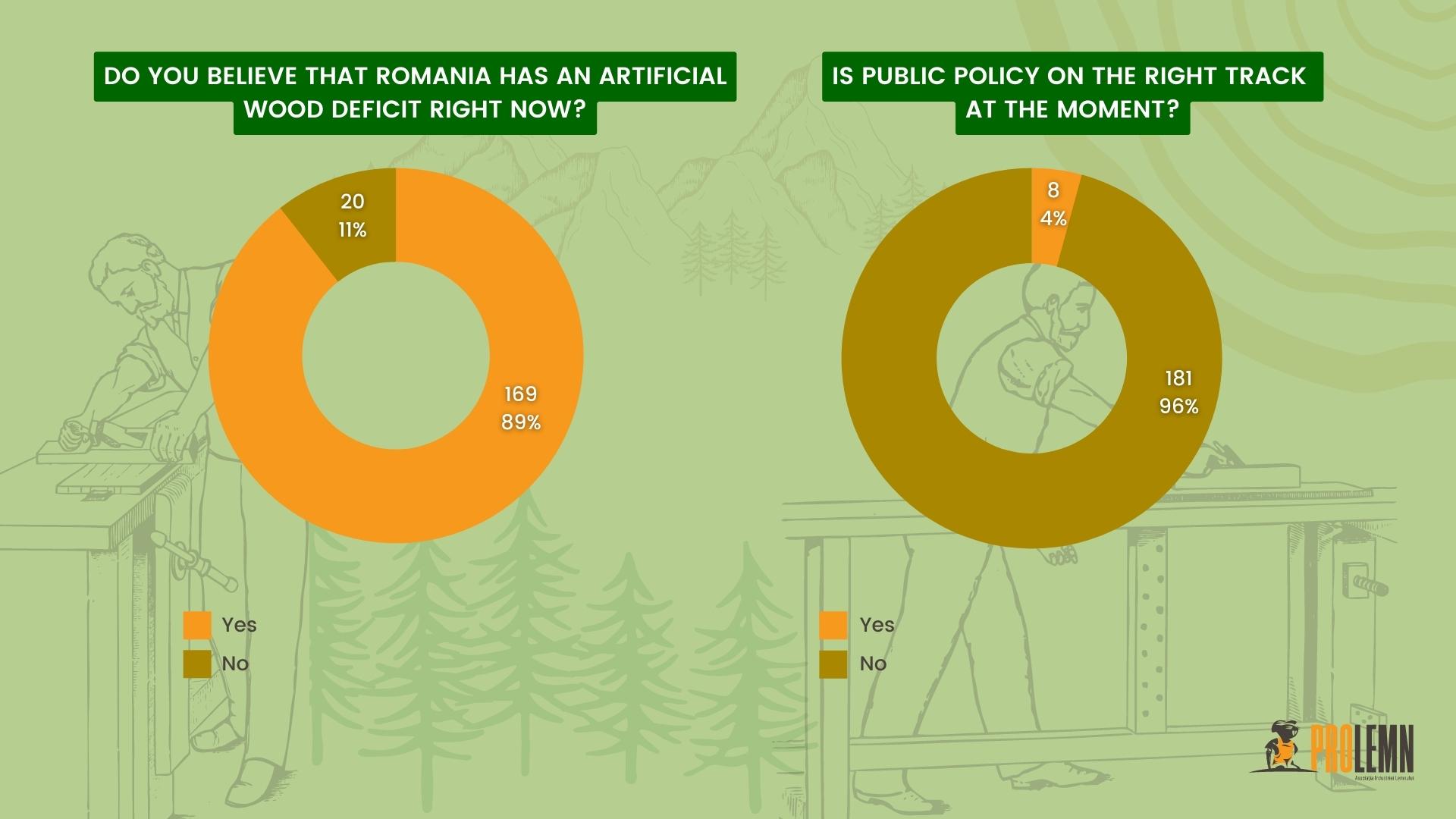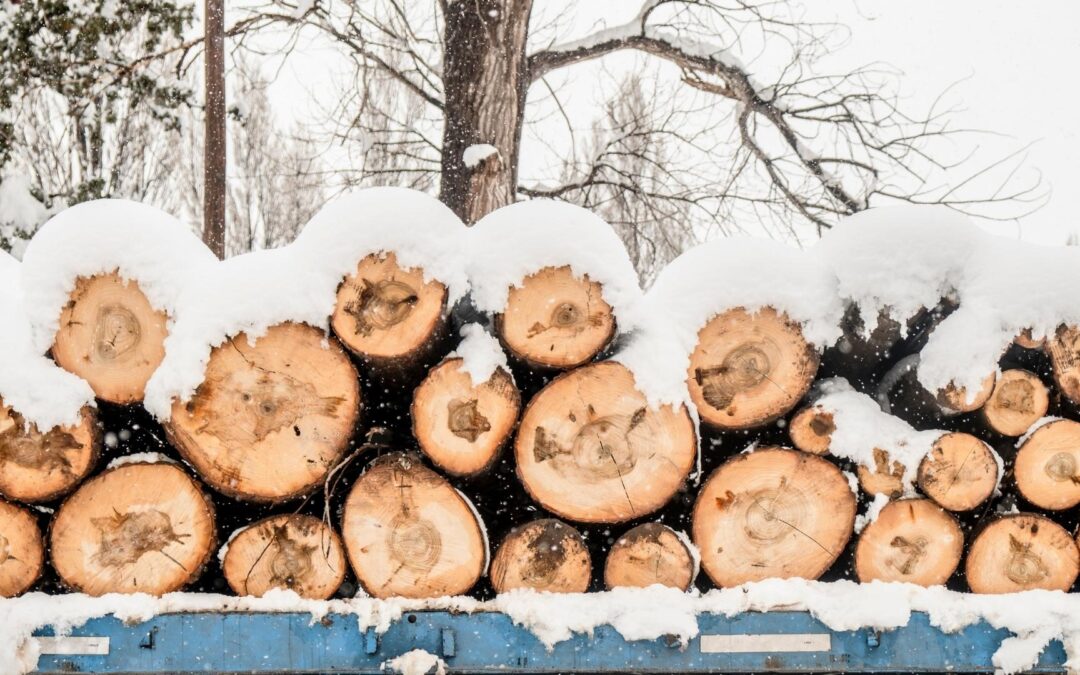Is there an artificial wood crisis in Romania or not? The Association of the Wood Industry – Prolemn took the pulse of the sector through a poll asking for feedback from forestry and wood industry professionals, a survey also supported by the Romanian Furniture Manufacturers Association and distributed by Fordaq – The Forestry Community, for a representation as wide as possible.
The questionnaire was answered by 189 representatives of companies from the entire wood value chain, which makes the results highly representative of the entire wood-based economy.
About half of the responses came from the wood processing industry (other than furniture production), 19.6% from the logging sector, 15% from the furniture industry and 9% from forestry. Large and very large companies were also represented, but 60% of respondents represent companies with a turnover of less than 1 million Euros per year. The answers are very homogeneous, their variance is very small according to the main field of activity and the size of the company, which gives maximum objectivity to the trends.

Wrong public policies during an artificial price crisis
The questions surveyed the perception of the situation in the market, faced with very high prices for wood, throughout the chain. The average price of timber at the auctions organized by RNP – Romsilva for main products (production of 2022) has increased more than 2.5 times! These increases are already transmitted on the value chain, up to the final consumer: prices doubled for softwood timber, increased 60-70% for pellets, doubled their prices for OSB, 40-50% for chipboard, 30-60% for furniture.
The AIL-Prolemn survey sought to determine whether raw materials shortages and huge prices are driven by normal economic mechanisms, the supply-demand ratio and trends in international markets, or are an artificial result, the effect of public policies and administrative decisions affecting the sector in recent months.
The answers were eloquent. Almost 90% of respondents (89.4%) believe that we have an artificial wood crisis at the moment, and 95.8% believe that the direction of public policies for the sector is wrong!

Three-quarters of respondents bought or harvested less wood than last year by more than 10%. Of these, half purchased or harvested at least 30% less!
In the entire value chain, only 20% of respondents have normal stocks of raw materials. Worryingly, 55% of the responding companies show that the low level of stocks creates uncertainties regarding the ability to honour their contracts.

Economic and social effects of the crisis
Companies in the forest-timber sector currently have about 150,000 employees and a cumulative turnover of over 7.1 billion Euros. The sector’s contribution to GDP formation is about 3.5%, and through exports of extremely high value-added products it contributes 3.5 billion Euros net to Romania’s trade balance.
But the crisis will affect this dynamic and vital sector of the economy, with disastrous social effects.
Due to low stocks and difficulties in sourcing raw materials, about 61% of respondents predicted that they would suffer a significant reduction in production in the near future. One in five (19% of the total) estimates a drastic reduction in activity, of at least 50%.
Reduced production will lead to layoffs and closures of production units, which will affect communities in forest-dependent areas, some of the most disadvantaged areas in the country. Over 80% of respondents indicated that they will use staff reductions to compensate for the lack of raw materials, and 25% of the total provide for the closure of production capacity (sections, work points).

Requests of the sector, in order of priority
The questionnaire also asked for the opinion on the measures required to overcome this moment of crisis. In order of the preferences expressed by the respondents, the most important measures that decision makers can take are the following:
- The Ministry of Environment must amend OM 1947/2021 on the procedure for reviewing forest management so that the procedure is applied for the future and does not affect the volume of wood available in the market (64.6%)
- RNP – Romsilva to offer wood in the market at the level of the possibility of harvest established by the forest arrangements (56.1%)
- Fair financing of forests in the National Strategic Plan, of at least 5%, at the median level of allocation in European countries (50.8%)
In the timber industry, we are witnessing an artificial timber crisis induced by misdirected public policies for the forestry sector. The crisis began last spring with the implementation of SUMAL 2.0, intensified in the autumn because of the decision to retroactively review environmental permits for forest management units regulated by OM 1947/2021, and became dramatic in terms of a timber offer at major auctions by RNP – Romsilva reduced by 40% compared to previous years. The timber industry cannot cope with an artificial 2.5-fold increase in prices for timber resources and especially a lack of resources. Production capacity is resized to the existing physical resource. We have already witnessed closures of large production capacities, but decision-makers have not perceived the scale of the crisis. This survey unequivocally shows the scale of the crisis and the simple steps that need to be taken. In the end, the costs of the artificial crisis of wood resource will be paid by all consumers of wood products – and here is found in one way or another the entire population of Romania, from consumers of firewood, timber, packaging, construction materials up to the furniture. But there are also high social costs – see layoffs and even environmental costs that are ignored. If we use less wood, we will use more plastic, concrete and cement and burn more coal, with well-known effects!
